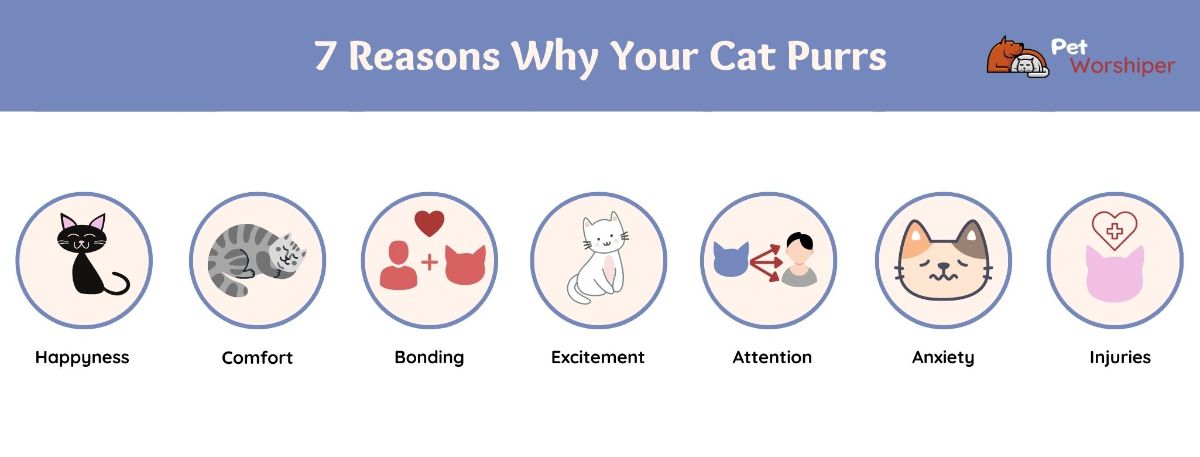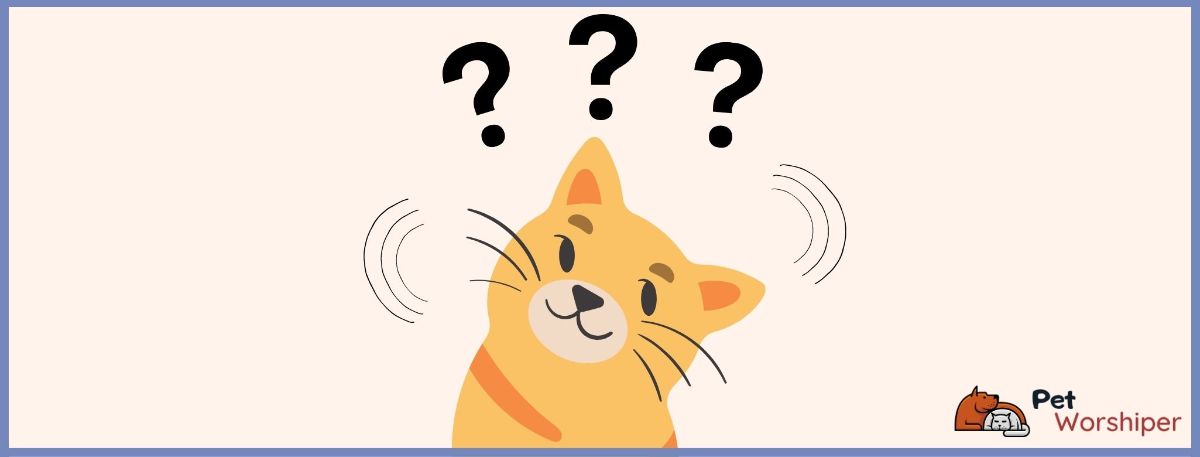
There is nothing better than having a purring feline friend cuddled up into your lap. We’ve always been told that an affectionate and purring cat is evidence of a happy furry friend, but there may be more to the behavior than what meets the eye.
The purring of your beloved cat can soothe even the worst of days, leading many to wonder if there is certain magic behind this mysterious feline behavior. Not only may a cat’s purr harbor unique power, but it may also be a form of feline communication.
There is an endless list of questions surrounding the details of purring in cats, so we’ve created a detailed guide with everything you need to know about the behavior. To help all the curious cat lovers out there, let’s dive into the details below!
What Is Purring In Cats?
A purr is a unique fluttering sound made by our domestic feline friends. This continuous vibration can range in volume, with some purrs being loud enough to hear them across a room.
Most purrs rattle a cat’s entire body, allowing the owner to feel the vibration the moment they touch the cat’s body. Most purrs are a display of contentment from the cat, but it can be a way to communicate an array of different emotions.
How Do Cats Purr?

To many cat owners’ surprise, cats do not have an organ dedicated to purring. Though originally thought to be the sound of blood pushing through the inferior vena cava, purring is actually a result of vibration within the vocal box.
Purring is a result of rapid movement of the muscles of the feline larynx and diaphragm. Inspiration causes air to make contact with these vibrating muscles, resulting in the soothing purr sound we know and love.
Purring is the only feline sound that occurs during both inspiration and expiration. Meowing only occurs when a cat inhales, creating even more allure around the mystery of purring.
Do All Cats Purr?
If you have a feline companion in your home, you will likely hear them purr from time to time. Not only is this a unique sound that all domestic felines make, but there are even some wild cats that purr on occasion as well.
Some other feline species that participate in the purring behavior include Cheetahs, Bobcats, Lynx, Ocelots, and even Pumas. Big cats such as Lions and Cougars can make purr-like sounds, but the ligaments surrounding the hyoid bone prevent the vibration needed to create a true purr.
The Magic Behind Purring
Though purring is a common behavior that we see in our cats each day, there is quite a bit of magic and mystery around the subject. Not only are we unaware of the exact reason why our cats purr, but there are fascinating benefits surrounding the action.
For example, purring is believed to have healing properties when practiced in certain situations. The low-frequency vibration of the purr is typically around 26 Hertz, which is not that far from the standard range that promotes tissue and bone regeneration.
This observation is known as “purr therapy”, and it has been practiced in feline friends ranging from domestic cats to wild bobcats. Some experts believe that this behavior originated in wild cats during the hunt, as they needed to promote bone health in the time spent waiting for their prey.
Not only can a purr be used as a strengthening method in some cases, but it can also be used as a self-soothing tactic. These low-frequency vibrations are thought to calm cats in a position of stress, allowing them to regulate their breathing and lower their blood pressure. As you can see, cats are even more impressive than we thought!
7 Reasons Why Your Cat Purrs
As we mentioned above, we do not know the exact reason why our feline companions purr. Purring can be used for situations ranging from communication to self-soothing, so it’s important to be educated on the many potential factors behind this behavior.
To help you better understand your purring friend, let’s discuss some of the most common reasons below.

Happiness
The most common reason why our cats purr is that they are happy. Cats often purr when their owners pet them, walk through the door after being away, and do any other activity that can offer joy. A purr is essentially a smile, showing you just how happy your cat is to be in your presence.
Comfort
Many cats purr when they are comfortable in their surroundings. Purring will typically occur when we cuddle with our cats on the couch, offer them their favorite blanket, or even when they find a warm spot next to the heater. Purring is essentially a cherry on top of their cozy surroundings, as this action further soothes them into bliss.
Bonding
Kittens learn how to purr to their mothers within weeks of being born. Their purr helps their mother know when they are awake and ready for feeding, forming a bonding connection between purring and motherly nurturing. If your cat purrs in your presence, this can be their way of further bonding with you.
Excitement
Some cats will purr when they are experiencing excitement. This can be a result of something as simple as their favorite human getting home from work, or even when their microchip pet feeder opens upon their arrival. If your cat is filled with joy, you may hear their purr box activate.
Attention Seeking
Some cats will bond in an effort to gain our attention. Cats have been found to conceal light whines within their purrs, which is a sound known to trigger a nurturing effect in humans. By doing this, they can easily manipulate us into offering them attention. Your cat may implement this tool when they are hungry, bored, or even when they simply want you to look their way.
Anxiety
Though many of us associate purring with happiness, it’s important to realize that purring can be a sign of an anxious cat. Many cats will purr when they are in a stressful situation, hoping to self-soothe with the calming vibration of their purr. A cat’s purr has been proven to regulate breathing and decrease their blood pressure, essentially offering built-in anxiety relief.
Injuries & Sickness
The low frequency of purring vibrations has been proven to stimulate the growth of tissues within the cat’s body. Due to the healing properties, a purr may contain, cats may instinctively purr in an effort to relive their illness. Though purring will not likely cure their ailment, this is not uncommon to find an injured cat that is purring throughout the pain.
At What Age Do Cats Begin To Purr?
Every kitten is different, but most kittens will begin to purr softly when they are 2-3 days old. They will practice the behavior in an effort to gain their mom’s attention, typically becoming a purring machine by 3 weeks of age.
It’s important to note that some kittens purr more than others, so it is not necessarily a cause of concern if your kitten is not yet purring. Some kittens may feel more comfortable using other forms of communication, so this should not cause any worry if they are fine otherwise. Your kitten will purr at some point, making the moment even more special when they finally do so!
Can Purrs Help Humans Heal?
It is unclear whether or not a cat’s purrs can heal humans in any way, but experts do suggest that low-frequency vibrations may help to combat anxiety and depression. Purrs at a frequency of 25-100 Hertz have been shown to reduce blood pressure and regulate breathing, both of which can be impacted by the stressors of daily life.
At the end of the day, it is very difficult to fight the feeling of comfort that comes from a purring cat. A cat that cuddles up with its owner may even be trying to heal them, as cats may instinctively purr when those around them need healing. With this knowledge, we can understand why cats make such wonderful therapy animals!
So Why Is My Cat Purring?

Now that you know the most common factors behind a cat’s purr, you can begin to understand the meaning behind your cat’s soothing roar. By examining their daily behaviors and the onset of their purring, you can decipher the clues your feline friend has to offer.
For example, if your cat purrs each time you fill their empty food bowl, you can typically assume that they are excited about their meal. If your cat purrs in their crate on the way to your vet’s office, they may be purring in an effort to soothe their nerves.
Every cat is different, so education around the purring behavior is the best way to better understand your feline companion.
Final Thoughts
As you can see, purring is a complex behavior that still perplexes experts today. Though we already knew that our feline friends are special, their purring superpowers seal the deal!

